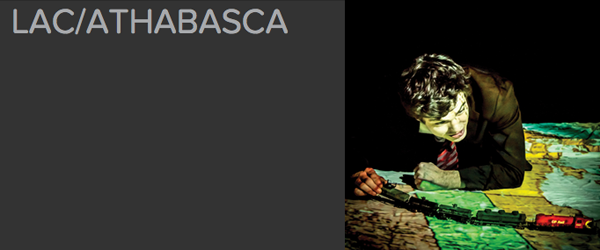
Vancouver Fringe Festival 2014 Review: Lac/Athabasca
Reviews, TheatreI sit in the second row, and see two big rectangular blocks shining in green light flanking the stage. They look like the obelisks from 2001: A Space Odyssey, only green, and I wonder about the future of my next hour.
Lac/Athabasca is an odyssey in its own right. Inspired by the Lac Mégantic derailment of July 2013, the play brings to life the social, environmental, and economic effects of this disaster. Len Falkenstein’s vision is clear in the beautifully structured play, which is framed by “Ben,” a glacier tour guide played by Jake Martin. As the audience takes the train, groups of characters cycle through the narrative in an episodic manner.
Maps and images of the affected environments are projected onto the green screen blocks (the obelisks) and the black curtain as the cross-Canada narrative progresses. Costumes appear irrelevant as all actors don dark, solid colours, emphasizing their presence and acting above all else.
Lac/Athabasca begins with a 19th Century fur trader, “Edward,” played by Alex Donovan, and a 19th century Metis trapper and guide, “Francois,” played by Jake Martin (who also plays the tour guide, “Ben,” mentioned earlier) who sit in a boat and exchange banter. Claims about Canada’s wilderness and beauty are abundant, but the superficiality dissolves after a young man, “Thierry” (Jean-Michel Cliche), delivers a monologue, hinting at the personal depth of the catastrophe’s effects, and leaving the audience in anticipation.
Two biologists, “Janice,” played by Rebekah Chassé, and “Peter,” (Alex Donovan) find mutations in animals in the lake, and an argument about statistics and scientific accuracy causes Janice to have a panic attack, revealing trauma incurred from a bear attack—tests later showed the bear was starving, despite the abundance of food in the area. The conflation of the psychological and environmental impact is clear, and the effects of the catastrophe only deepen. A sense of doom certainly drives Lac/Athabasca. Even though the audience knows of the catastrophe, the suspense is maintained. Chassé recites dramatic lines after the panic attack scene, but her natural composure and flexibility carries them through smoothly. She later plays “Huguette,” the mayor of Lac Madawaska, and her French accent is humorous but spot-on.
All actors rotate playing different roles, and jump into these roles after only a few seconds behind the curtain. Emily Bossé impresses with her subtle facial expressions and grace, switching between the roles of a young aboriginal woman, an exotic dancer, and a resident of Lac Madawaska, and Alex Donovan’s energy refreshes the dark set with humour and nerdiness. Eric Hill’s music is key in setting the mood—it immediately placed me in the gorgeous, deliberate mise-en-scène reminiscent of the one in the film Contintental by Montreal director Stéphane Lafleur.
Ultimately, Lac/Athabasca is grand, and ambitious in scope. Len Falkenstein’s daring vision to direct a non-linear play will remain memorable. Lac/Athabasca definitely deserves more acclaim.
For those who like films by Atom Egoyan, moody plays, well-written scripts, fantastic acting, and Can Lit, you can catch Lac/Athabasca at Fringe on:
| Thursday Sep 11 2014 8:45 PM |
| Saturday Sep 13 2014 7:15 PM |






















